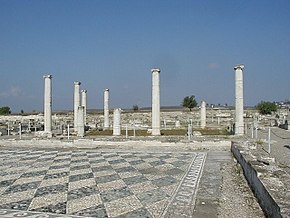Pella
| Πέλλα | |

Atrium with a pebble-mosaic paving in Pella
|
|
| Location | Macedonia, Greece |
|---|---|
| Coordinates | Coordinates: 40°45′17″N 22°31′16″E / 40.754669°N 22.521050°E |
| Type | Settlement |
| History | |
| Cultures | Ancient Greece |
Pella (Greek: Πέλλα), is an ancient city located in Central Macedonia, Greece, best known as the historical capital of the ancient Greek kingdom of Macedon in the time of Alexander the Great. On the site of the ancient city is the Archaeological Museum of Pella.
Pella is first mentioned by Herodotus of Halicarnassus (VII, 123) in relation to Xerxes' campaign and by Thucydides (II, 99,4 and 100,4) in relation to Macedonian expansion and the war against Sitalces, the king of the Thracians. According to Xenophon, in the beginning of the 4th century BC it was the largest Macedonian city. It was probably built as the capital of the kingdom by Archelaus I, replacing the older palace-city of Aigai although there appears to be some possibility that it may have been created by Amyntas. In antiquity, Pella was a strategic port connected to the Thermaic Gulf by a navigable inlet, but the harbour and gulf have since silted up, leaving the site landlocked.
Archelaus invited the painter Zeuxis, the greatest painter of the time, to decorate his palace. He also later hosted the poet Timotheus of Miletus and the Athenian playwright Euripides who finished his days there writing and producing Archelaus. Euripides Bacchae was first staged here, about 408 BC. Pella was the birthplace and seats of Philip II and of Alexander the Great, his son.
...
Wikipedia

